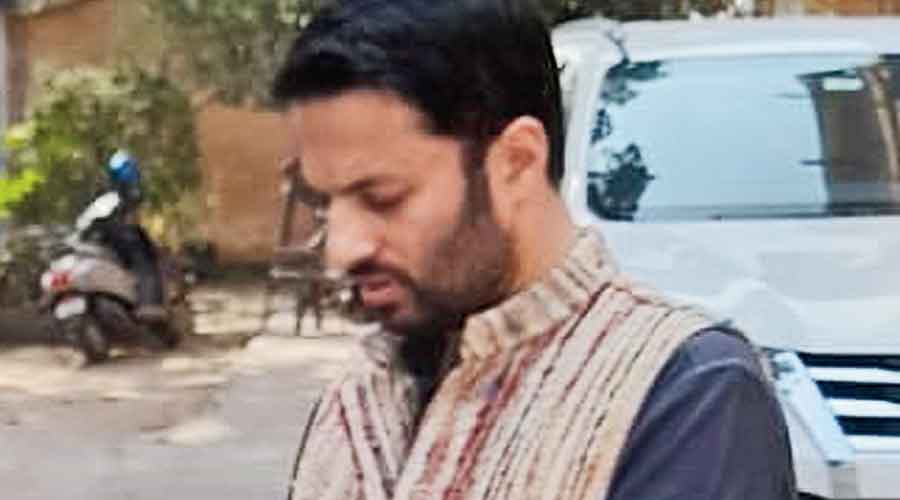Ali Khan’s forefathers had played a key role in freeing India from British rule. Now, he is laying the bedrock of a more inclusive form of secularism amenable to the changing times that he believes will deliver the people of Uttar Pradesh from the “communal shackles” of the BJP.
The Cambridge-educated professor of history and politics at Ashoka University in Haryana’s Sonipat is the core ideologue of the team Akhilesh Yadav has built to envision a “Nayee Sapa” (New Samajwadi Party) that aims to vanquish the BJP in the ongoing Assembly elections.
Ali Khan, 39, and the team are shaping the Samajwadi Party’s ideology and structure to meet the new challenges posed by the BJP under Narendra Modi, Amit Shah and Yogi Adityanath.
Ali Khan, a national spokesperson of the Samajwadi Party, calls his home the imposing Mahmudabad House, the palace built by Wajid Ali Shah, the erstwhile nawab of Oudh. Lord Dalhousie had annexed Oudh in 1856, deposing Wajid Ali Shah. The British subsequently handed over the mansion to Raja Nawab Ali Khan, talukdar (revenue officer) of the Mughals and Ali Khan’s forefather. But Nawab Ali Khan revolted against the British in 1857 and died fighting its army.
Mahmudabad House in the Kaiser Bagh area of Lucknow has not been untouched by the ravages of time — the glaze on its walls, arches and domes is fading. But the grandeur of the mansion remains intact.
The history of the freedom struggle still reverberates in its rooms and courtyards: it was in Mahmudabad House that the historic Lucknow Pact of 1916 was drafted by Ali Khan’s great-grandfather and towering Congress leader Ali Mohammad Khan. The pact ensured that the Congress and the Muslim League worked together to throw the British out of India. Muhammad Ali Jinnah had come to the palace to sign the pact.
“See, we have a glorious history of Indians — Hindus and Muslims — fighting together against British rule. But we can’t afford to bask in the glory of the past. We can’t afford to just carry forward the inheritance of our socialist icons Ram Manohar Lohia and Jayaprakash Narayan,” Ali Khan says.
“It’s no longer a plain battle between secularism and communalism. What is needed more is to redefine and rephrase secularism, making it more inclusive, addressing the material and emotional needs of the people in the changed scenario. We have to accommodate the traditional values of our society — Hindus and Muslims — while redefining secularism,” he explains.
Ali Khan, who completed his primary education from La Martiniere School in Lucknow, was sent to England by his father, Congress leader Mohammad Amir Mohammad Khan, 79, when he was 11 years old. Ali studied English, Arabic and Persian in the UK and Damascus. He obtained a master’s degree from Amherst College in Massachusetts, the US, and pursued MPhil and PhD at Cambridge.
Ali Khan has authored several books such as Poetry of Belonging-Muslim Imaginings of India (1857-1957), published by the Oxford University Press. He writes columns for The Guardian and HuffPost.
Ali Khan, true to his “assignment” from the Samajwadi Party to redefine secularism, counters the Rashtriya Swayamsevak Sangh (RSS) through the Ramcharitmanas and the Bhagavad Gita.
“Kaam na koh mad maan na moh/ Lobh na chhobh na raag na droh/ Jinke kapat dam nahin bhaya, tinhe hridaya basu Raghuraya (Lord Ram lives in the heart of the one who is free from lust, desire, arrogance, anger, cunning and regret),” Ali Khan chants a couplet from Tulsidas’s Ramcharitmanas at a Samajwadi Party election meeting in Mahmudabad.
He asks voters to themselves judge if RSS-BJP leaders live up to the parameters Maryada Purushottam Ram had set for himself.
“I teach the Bhagavad Gita translated by Dil Mohammad in Hindustanti to my students at Ashoka University,” Ali Khan says, adding: “Be it the Gita, Ramcharitmanas, the Quran Sharif or other religious treatises, we have to discover secularism in their values and ideals. That’s the most suitable way to counter communalism.”
Ali Khan draws applause from the audience when he quotes from the Ramcharitmanas and the Gita with felicity.
Akhilesh’s father Mulayam Singh Yadav had invited Ali Khan’s father, Mohammad Amir Mohammad Khan, to join the Samajwadi Party many times but the latter didn’t agree.
However, Akhilesh set his sights on Ali Khan when the latter was doing his PhD at Cambridge in 2011 and drafted him into the party.
“Akhilesh is very respectful towards his colleagues. He has been affable to me all through. I joined him when he was yet to become chief minister (in 2012). There was no change in him when he became chief minister. And there is no change in him now that he is out of power. He gives us liberty to work in the party in our own way,” Ali Khan says.
He explains how the Samajwadi Party didn’t let the BJP exploit the Karnataka hijab row in the Uttar Pradesh elections.
“We simply asked Muslim youths not to react to it, rather be polite to the ones trying to fuel anger among them over the Karnataka hijab row. Now, the RSS-BJP is disturbed that the hijab controversy is making no impact in elections. Employment, price rise and development are the issues on which the elections should be fought. Despite the BJP’s machinations, the elections in Uttar Pradesh are being fought on the real issues and here lies the scope for the Samajwadi Party’s victory,” Ali Khan says.
His grandfather, Amir Ahmad Khan, who was the treasurer of the All India Muslim League, migrated to Pakistan in 1957 but his grandmother Rani Kaniz Abid stayed back in Lucknow with her son and Ali’s father. “I won’t leave my motherland,” she told her husband.
Ali Khan idolises his grandmother’s spirit. His wife is Onaiza Drabu, an author and resident of Kashmir who works with the United Nations.










